[Dec 2007, Volume 4 Quarterly Issue] Pdf File size - The IIPM Think ...
[Dec 2007, Volume 4 Quarterly Issue] Pdf File size - The IIPM Think ...
[Dec 2007, Volume 4 Quarterly Issue] Pdf File size - The IIPM Think ...
You also want an ePaper? Increase the reach of your titles
YUMPU automatically turns print PDFs into web optimized ePapers that Google loves.
MORE MARKETS, LESS GOVERNMENT<br />
in North Gujarat, thriving groundwater<br />
markets exist, as farmers extract groundwater<br />
using tubewells and sell it primarily<br />
to other farmers for irrigation.<br />
<strong>The</strong> ‘tanker economy’ is very well established,<br />
with highly developed networks<br />
of tanker owners supplying water<br />
to industries, colonies, commercial establishments<br />
and even households on a<br />
regular or need-based basis. In cities<br />
like Ahemdabad, regular home delivery<br />
of bottled drinking water is a common<br />
feature. Last but not the least, the bottled<br />
water industry has become a thriving<br />
multi-crore rupees business. For all<br />
this, water remains largely in the public<br />
domain. <strong>The</strong> British experiments with<br />
private irrigation were not very successful<br />
and canal irrigation has been essentially<br />
a public sector endeavour in independent<br />
India. While groundwater is<br />
largely in the private domain, with the<br />
landowners having unrestricted right to<br />
pump out as much water as they want<br />
from their lands – it is largely operated<br />
on an individual and unorganised basis.<br />
Tankers and other supplies to households,<br />
colonies etc. operate more like<br />
informal markets. Even otherwise, these<br />
water markets have formed a small part<br />
of the huge water economy and even a<br />
smaller part of the vast water system.<br />
This is so for a good reason.<br />
Water As A Social Responsibility<br />
Water is a biological necessity for survival.<br />
Water is also the foundation of the<br />
livelihoods of millions of people – agriculture,<br />
fishing, dairying, cattle rearing<br />
being some of the occupations that depend<br />
critically on water. Water is a critical<br />
input into the development process,<br />
apart from the being an essential requirement<br />
for industry and manufacturing.<br />
Thus, water has a vital social significance<br />
apart from its commercial<br />
value. Indeed, water is a basic, fundamental<br />
human right. Due to all this, the<br />
production and provision of water has<br />
long been considered a social and moral<br />
responsibility of the community and the<br />
Government. This is all the more so in<br />
India - since the income and resource<br />
distribution in India is heavily skewed<br />
and iniquitous, and we have large sections<br />
of populations who cannot afford<br />
to bear the cost of even the minimum<br />
necessary supplies of water. This makes<br />
low-priced provision of water services<br />
essential. This is also the reason that<br />
the sector has been heavily subsidised,<br />
and has remained in the public domain<br />
till now.<br />
A New Regime<br />
In the last decade or so, it is being argued<br />
that the water sector must be operated<br />
on market based principles and the<br />
Government must change its role to only<br />
that of a regulator, with the private sector<br />
being allowed into the sector.<br />
Several reasons are being advanced<br />
for this. <strong>The</strong> many serious problems of<br />
the water sector and its abysmal performance<br />
in delivering services is being attributed<br />
primarily to the inefficiency and<br />
corruption of the government system –<br />
qualities that are believed to be largely<br />
inherent to public sector. <strong>The</strong> public sector<br />
is also generally considered as deficient<br />
in modern technology, lacking<br />
management skills and badly administered.<br />
Further, the lack of internal resource<br />
generation due to below-cost supply<br />
is leading to deficiency of resources<br />
with the Government to invest in the<br />
needs of the sector.<strong>The</strong> achievements of<br />
Tankers and other supplies to households, etc. operate<br />
more like informal markets. Even otherwise, these water<br />
markets have formed a small part of the huge water economy<br />
and even a smaller part of the vast water system<br />
the telcom sector, now operating on<br />
market based principles with a large<br />
number of private players is also being<br />
cited as evidence that these polices can<br />
improve access and service levels. Thus,<br />
“More Market, Less Government” is the<br />
mantra being advocated for the water<br />
sector also. As this approach gets translated<br />
into new policies, laws and programs,<br />
some important questions need<br />
to be answered – will this work? What<br />
will be the consequences of such an approach<br />
in the water sector? Is this the<br />
correct policy choice? In some ways, the<br />
cart has already been put before the<br />
horse. While these serious questions<br />
have not been fully debated, far-reaching<br />
transformations in the sector have<br />
already been set in motion.<br />
<strong>The</strong>se transformations can be seen as<br />
an extension of the LPG regime into the<br />
water sector. As with the initial set of<br />
reforms in 1991, the changes in the water<br />
sector are also being driven by the World<br />
Bank and other international financial<br />
a g e n c i e s l i k e t h e A s i a n D e ve l o p m e nt B<br />
ank. Water has been among the last of<br />
the sectors to be opened up to the reforms<br />
process; however, we just note this<br />
without going into the reasons for<br />
THE INDIA ECONOMY REVIEW<br />
47


![[Dec 2007, Volume 4 Quarterly Issue] Pdf File size - The IIPM Think ...](https://img.yumpu.com/29766298/46/500x640/dec-2007-volume-4-quarterly-issue-pdf-file-size-the-iipm-think-.jpg)
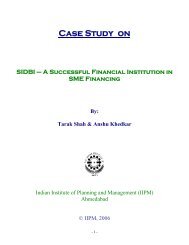
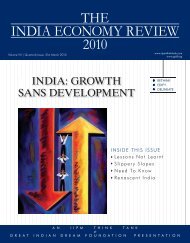
![[Feb 2008, Volume V Annual Issue] Pdf File size - The IIPM Think Tank](https://img.yumpu.com/43961117/1/190x245/feb-2008-volume-v-annual-issue-pdf-file-size-the-iipm-think-tank.jpg?quality=85)
![[June 2008, Volume V Quarterly Issue] Pdf File size - The IIPM Think ...](https://img.yumpu.com/41693247/1/190x245/june-2008-volume-v-quarterly-issue-pdf-file-size-the-iipm-think-.jpg?quality=85)
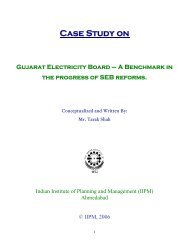
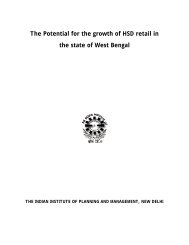
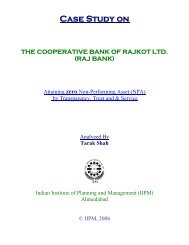


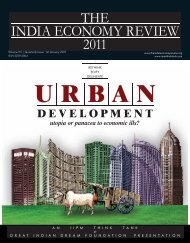
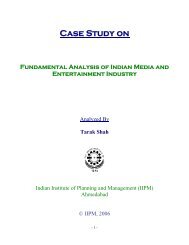
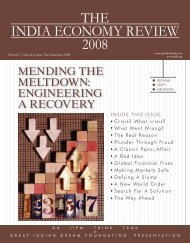
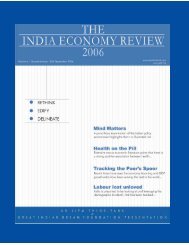
![[Volume VI | Quarterly Issue: 31st May 2009] Pdf File size](https://img.yumpu.com/27796051/1/190x245/volume-vi-quarterly-issue-31st-may-2009-pdf-file-size.jpg?quality=85)